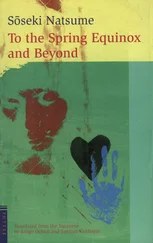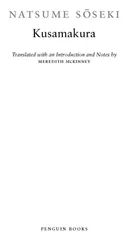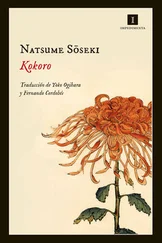O-Nobu deftly unwrapped the parcel and removed a tin of tea, bread, and butter.
“My goodness, this is what you wanted? You should have let me send Toki to fetch it for you.”
“What does a maid know? There’s no telling what she would have bought.”
Before long, O-Nobu had prepared some fragrant toast and steaming Oolong tea.
When he had finished his simple Western meal, neither breakfast nor lunch, Tsuda spoke as though aloud to himself.
“I was planning to go to Uncle Fujii’s this morning. I wanted to tell him about my illness and apologize for not visiting while I was at it, but it’s already so late.”
He meant that he intended, having missed the morning, to discharge the obligation of a visit that afternoon.
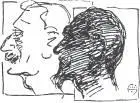 FUJII WAS Tsuda’s father’s younger brother. Obliged by the life of a civil servant to be eternally on the move from one region to the next, three years in Hiroshima, two in Nagasaki, and so forth, Tsuda’s father, burdened by the necessity of dragging his son from post to post and sorely concerned that his education was being compromised as a consequence, had resolved early on to entrust the boy’s care entirely to his younger brother, who had managed to raise Tsuda without going to much trouble. Their relationship as a result went beyond the realm of normal uncle and nephew. To characterize them without reference to the difference in their temperaments and professions, they were more like parent and child than uncle and nephew. Perhaps it would be most appropriate to describe their relationship as, to coin a phrase, “a second father and son.”
FUJII WAS Tsuda’s father’s younger brother. Obliged by the life of a civil servant to be eternally on the move from one region to the next, three years in Hiroshima, two in Nagasaki, and so forth, Tsuda’s father, burdened by the necessity of dragging his son from post to post and sorely concerned that his education was being compromised as a consequence, had resolved early on to entrust the boy’s care entirely to his younger brother, who had managed to raise Tsuda without going to much trouble. Their relationship as a result went beyond the realm of normal uncle and nephew. To characterize them without reference to the difference in their temperaments and professions, they were more like parent and child than uncle and nephew. Perhaps it would be most appropriate to describe their relationship as, to coin a phrase, “a second father and son.”
Unlike Tsuda’s father, this uncle had lived his entire life without ever leaving Tokyo. In this regard alone, a comparison between them, Tsuda’s father having spent a goodly half of his life on the move, revealed a major difference. In Tsuda’s eyes at least, this appeared significant.
A dawdler along the road of life .
Among the expressions his uncle had employed to describe his father, these words for no particular reason had inscribed themselves in Tsuda’s mind, and he had quickly enough become certain that his father was indeed just such a man. The phrase remained with him even today. At the time, his young mind had failed to grasp its meaning, and even now he was none too clear about what his uncle had intended. It was simply that he recalled the words whenever he looked at his father’s face. It seemed to him that the fleshless, narrow face with a fortuneteller’s scraggily beard on the chin and his uncle’s description corresponded almost perfectly. Ten years ago, like a man suddenly fed up with a long pilgrimage, his father had withdrawn from government service and gone into business. After eight years in Kobe, he had built a house on land he had purchased in Kyoto in the meantime, and two years ago he had finally relocated there. Tsuda hadn’t realized that his father had settled on the secluded old capital as a retreat, or that it had transformed into the ground of his final days. At the time, his uncle had said to him, the sarcasm in his voice causing his nose to wrinkle, “It seems that big brother has managed to salt away some money. If that balloon bag isn’t floating off somewhere, you can bet it’s money that’s weighing him down.”
In his own case, money had never been a weight, no matter how much time passed, and even so he had never moved. He had always been in Tokyo and had always been poor. This was a man who had never to this day received a salary. It wasn’t necessarily that he disliked being paid; it might have been more accurate to say that he was so willful that no one wished to employ him. He was inclined to oppose anything bound by rules and regulations, and even as he aged and his thinking changed somewhat, he continued to assert his characteristic stubbornness. This was because he well understood that amending his attitude at this late date was likely to earn him only the contempt of others and would in no way inure to his benefit.
With no experience of having engaged with the real world, grappling with plain truths, it was only natural that his uncle should have been an unreliable, a slipshod life critic, but at the same time, in another sense, he was an acute observer, and his acuity had its source entirely in his negligence. To put it otherwise, it was negligence that enabled him to speak and act in startling and original ways.
His knowledge was scattered rather than deep. He tended, accordingly, to put in his two cents on a wide variety of subjects. But at no time was he able to free himself from the observer’s attitude. It wasn’t only his status that made this inevitable; it was also the effect of his personality. The man definitely had a head, but he had no hands. Or if he did have hands, he never essayed to use them. They were always thrust inside his kimono. With an inherent indolence to go along with his taste for study, he was destined in the end to make a living with pen and paper.
 FOR THE past six or seven years, Fujii had been living the sort of life on the outskirts not uncommon to a man like himself in a corner of a plateau in the northwest quarter of the city near Waseda University. There were times when it struck him that the annual addition of houses large and small being erected in a district that, until recently, had been very much like a suburb, was gradually depriving him of the color green, and he would allow the pen in his hand to go idle as he reflected on his elder brother’s circumstances. At such moments he wondered whether he might borrow money from his brother and build a residence for himself. It seemed clear there was no chance a loan would be forthcoming. Not that his temperament would allow him to accept money even if it came to that. The man who had styled his brother a “dawdler on the road to life” was, truth be told, a life traveler with material anxiety. As is readily observed in the majority of people, anxiety about material things was hardly more than a degree of spiritual uneasiness.
FOR THE past six or seven years, Fujii had been living the sort of life on the outskirts not uncommon to a man like himself in a corner of a plateau in the northwest quarter of the city near Waseda University. There were times when it struck him that the annual addition of houses large and small being erected in a district that, until recently, had been very much like a suburb, was gradually depriving him of the color green, and he would allow the pen in his hand to go idle as he reflected on his elder brother’s circumstances. At such moments he wondered whether he might borrow money from his brother and build a residence for himself. It seemed clear there was no chance a loan would be forthcoming. Not that his temperament would allow him to accept money even if it came to that. The man who had styled his brother a “dawdler on the road to life” was, truth be told, a life traveler with material anxiety. As is readily observed in the majority of people, anxiety about material things was hardly more than a degree of spiritual uneasiness.
To get from Tsuda’s house to his uncle’s place, there was a convenient streetcar that ran alongside the Edo River for half the way. But the distance was short enough to be covered on foot in less than an hour, and Tsuda had the option of combining the visit with a walk rather than relying on crowded and noisy public transportation.
Leaving his house at a little before one, he ambled along the river’s edge, approaching the end of the streetcar line. The cloudless sky was high; the world was drenched in sunlight. The deep green of the trees covering the ridge ahead was distinctly visible as though highlighted.
Along the way Tsuda recalled the castor oil he had forgotten to buy that morning. The doctor had instructed him to take some around four this afternoon; he would have to stop at a drugstore for a bottle. Instead of turning right at the end of the line and crossing the bridge, he began walking in the opposite direction, toward the bustling shopping district. A brutal swath had been cut diagonally across a portion of the road along his route, apparently a project to extend the trolley track beyond the last station. Moving past craters where existing houses had been remorselessly demolished and hauled away, he reached a turning in the new road and saw a group of people gathered at the corner. The modest crowd was standing three or four deep in a semicircle around a man roughly Tsuda’s age. A pudgy fellow, he was wearing a cotton kimono with a narrow obi and clog shoes but had neither an umbrella nor a cap to cover his head. With a willow tree that had not been cut down at his back, he was holding in both hands a large bag with a cotton flannel lining as he surveyed the crowd.
Читать дальше
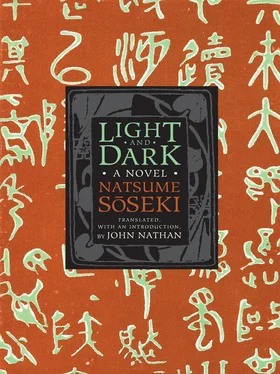
 FUJII WAS Tsuda’s father’s younger brother. Obliged by the life of a civil servant to be eternally on the move from one region to the next, three years in Hiroshima, two in Nagasaki, and so forth, Tsuda’s father, burdened by the necessity of dragging his son from post to post and sorely concerned that his education was being compromised as a consequence, had resolved early on to entrust the boy’s care entirely to his younger brother, who had managed to raise Tsuda without going to much trouble. Their relationship as a result went beyond the realm of normal uncle and nephew. To characterize them without reference to the difference in their temperaments and professions, they were more like parent and child than uncle and nephew. Perhaps it would be most appropriate to describe their relationship as, to coin a phrase, “a second father and son.”
FUJII WAS Tsuda’s father’s younger brother. Obliged by the life of a civil servant to be eternally on the move from one region to the next, three years in Hiroshima, two in Nagasaki, and so forth, Tsuda’s father, burdened by the necessity of dragging his son from post to post and sorely concerned that his education was being compromised as a consequence, had resolved early on to entrust the boy’s care entirely to his younger brother, who had managed to raise Tsuda without going to much trouble. Their relationship as a result went beyond the realm of normal uncle and nephew. To characterize them without reference to the difference in their temperaments and professions, they were more like parent and child than uncle and nephew. Perhaps it would be most appropriate to describe their relationship as, to coin a phrase, “a second father and son.” FOR THE past six or seven years, Fujii had been living the sort of life on the outskirts not uncommon to a man like himself in a corner of a plateau in the northwest quarter of the city near Waseda University. There were times when it struck him that the annual addition of houses large and small being erected in a district that, until recently, had been very much like a suburb, was gradually depriving him of the color green, and he would allow the pen in his hand to go idle as he reflected on his elder brother’s circumstances. At such moments he wondered whether he might borrow money from his brother and build a residence for himself. It seemed clear there was no chance a loan would be forthcoming. Not that his temperament would allow him to accept money even if it came to that. The man who had styled his brother a “dawdler on the road to life” was, truth be told, a life traveler with material anxiety. As is readily observed in the majority of people, anxiety about material things was hardly more than a degree of spiritual uneasiness.
FOR THE past six or seven years, Fujii had been living the sort of life on the outskirts not uncommon to a man like himself in a corner of a plateau in the northwest quarter of the city near Waseda University. There were times when it struck him that the annual addition of houses large and small being erected in a district that, until recently, had been very much like a suburb, was gradually depriving him of the color green, and he would allow the pen in his hand to go idle as he reflected on his elder brother’s circumstances. At such moments he wondered whether he might borrow money from his brother and build a residence for himself. It seemed clear there was no chance a loan would be forthcoming. Not that his temperament would allow him to accept money even if it came to that. The man who had styled his brother a “dawdler on the road to life” was, truth be told, a life traveler with material anxiety. As is readily observed in the majority of people, anxiety about material things was hardly more than a degree of spiritual uneasiness.
